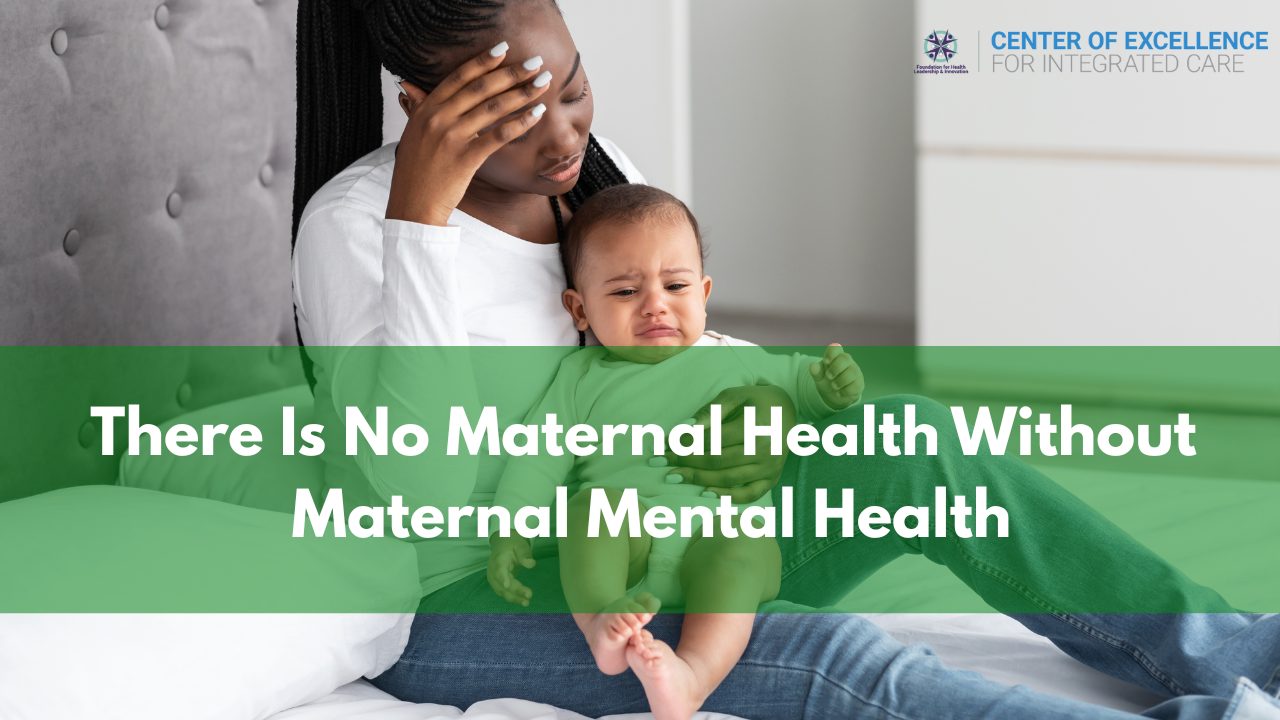
By: Austyn Holleman, MSW, MPH, LCSW
Director of Community Voice | Foundation for Health Leadership & Innovation
After years of graduate school and endless trainings on fancy treatment modalities, I find myself saying, “This feels hard because it is hard” more than anything else to the moms sitting across from me in a therapy session. I want them to hear and feel that their challenges managing their mental health during the perinatal period have nothing to do with personal failures or inadequacies, and everything to do with the systems that are failing them.
We live in an increasingly individualistic society, where families are left to raise children in dyads, or as single parents with little to no support. Our lack of affordable childcare, stagnant wages, and unrealistic expectations of a “good” parent are just a few of the endless factors coloring the experience of parents across the U.S. working hard every day to provide for their children.
Amidst all these challenges and the additional barriers that parents from historically disenfranchised communities face, it’s no surprise that mothers on a population level are unable to keep their heads above water.
What Are Perinatal Mood and Anxiety Disorders (PMADs)?
Perinatal mood and anxiety disorders (PMADs) are the leading complications of pregnancy and postpartum in the U.S. They are also the leading cause of maternal mortality, accounting for 23% of maternal deaths annually. Rates of PMADs and PMAD-related maternal deaths are significantly higher for Black/African American and Native American women, and lack of access to care in rural communities places those mothers at an even higher risk of severe morbidity or death.
Despite the significant risk that untreated mental health disorders pose to the perinatal population, data suggests that up to 75% of birthing people who experience a perinatal mood or anxiety disorder never receive treatment.
Evidence-Based Practices to Support Perinatal Mental Health
As a professional who straddles the maternal and child health (MCH) and mental health spaces, I am continually surprised at how often perinatal mental health gets left out of conversations around the maternal health crisis in this country. It is increasingly becoming more widely understood how critical it is to address the disparities in maternal morbidity and mortality. Even though PMADs are the leading cause of maternal death, mental health is treated as a completely separate issue.
If we want to make meaningful strides toward a safer experience in pregnancy and postpartum, we have to view physical and mental health as inextricably linked.
Several evidence-based practices have proven effective in addressing perinatal mental health issues and supporting the overall well-being of moms and their new babies. A few of these include:
- Integrating screening for PMADs in OBGYN AND pediatric offices and creating referral pathways for patients that screen positively
- Increasing access to community-based doulas who can provide education, support, and advocacy for moms during birth and in the postpartum period and can notice early signs of mental health challenges
- Increasing the number of providers trained in screening and treating PMADs (through initiatives such as Postpartum Support International’s PMC-C certification program)
- Increasing awareness around resources such as the 24/7 National Maternal Mental Health hotline and the NC Mental Health Matters Hotline
- Increasing access to and decreasing stigma around substance use treatment in the pregnancy and postpartum periods
Additional policy changes are necessary on the state and federal levels to support systems-level improvements and increase positive maternal health and mental health outcomes.
Initiatives and Advocacy for Improving Perinatal Mental Health Outcomes
Postpartum Support International is a key organization that advocates for these changes through the Mind the Gap initiative. Mind the Gap seeks to raise awareness around the perinatal mental health crisis in this country, highlighting populations who experience disparate levels of poor outcomes and naming specific legislative changes that will help move the needle.
At the state level, the North Carolina Department of Health and Human Services Division of Public Health also recently released their 2024-2026 Perinatal Health Strategic Plan, which “…seeks to address both the challenges of structural racism and of the pandemic by focusing on drivers of health.”
Please visit the NC Mental Health Matters website for more information about NC-specific resources supporting perinatal mental health.
Supporting Perinatal Mental Health Through the Maternal and Child Health Equity Action Network
At FHLI, we are dedicated to advancing whole-family health across North Carolina and building a healthier state where everyone can access the care they need. As part of that commitment, we have proudly housed the Maternal and Child Health Equity Action Network (MCHEAN) for the past two years.
After conducting a statewide landscape analysis in 2022, FHLI facilitated the development of the MCHEAN, bringing together over 50 participants, about half of whom had lived experiences with maternal and child health equity challenges.
A diverse range of participants, including health providers, community organizations, advocacy groups, government agencies, policymakers, researchers, educators, and individuals with lived experiences, engaged in meaningful, nuanced conversations about the root causes of the maternal and child health crisis.
Centering community voices throughout the process, the MCHEAN co-created action plans to enhance our state’s maternal and child health outcomes. The second action plan includes integrating behavioral health and medical care as a key strategy for supporting maternal health and improving outcomes.
If you’re interested in learning more and getting involved in the next phases of this essential work, please complete this brief form, and we will be in touch!
Austyn Holleman, MSW, MPH, LCSW
Director of Community Voice | Foundation for Health Leadership & Innovation

Austyn is a licensed clinical social worker with her Master of Social Work and Master of Public Health from UNC-Chapel Hill. Most recently, she served as a consultant for the National Network to End Domestic Violence in Washington D.C. while also serving as a perinatal mental health therapist and a doula.
Posted in Mental Health Awareness
